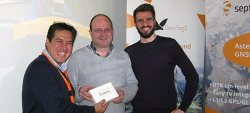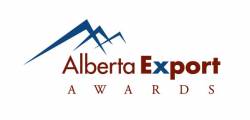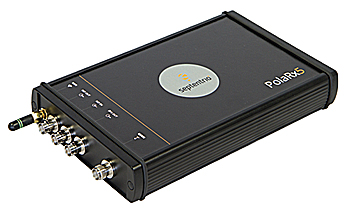 The KU Leuven Ecochallenge team. Photo source: Septentrio.
The KU Leuven Ecochallenge team. Photo source: Septentrio. Septentrio recently awarded the KU Leuven Ecochallenge team – the winners of the Galileo Masters (Flanders Challenge) of the European Satellite Navigation Competition (ESNC) – a special prize of an AsteRx-m UAS receiver for their proposal to use high-precision, high-reliability Galileo receivers to modernize inland waterway transport by introducing autonomous technology for the vessels.
Septentrio recently awarded the KU Leuven Ecochallenge team – the winners of the Galileo Masters (Flanders Challenge) of the European Satellite Navigation Competition (ESNC) – a special prize of an AsteRx-m UAS receiver for their proposal to use high-precision, high-reliability Galileo receivers to modernize inland waterway transport by introducing autonomous technology for the vessels.
The judging panelists were impressed with the proposal from the KU Leuven Ecochallenge team to use high-quality Galileo receivers to improve the safety and efficiency on autonomous and existing vessels (which can be retrofitted with the solution). The very ambitious proposal offers a pragmatic step towards rejuvenating inland waterways as a viable ecological alternative for freight transportation.
The KU Leuven team also participated in the Ecorace Challenge organized by the Flemish Waterways Agency and was both the overall winner in the cargo category, as well as being voted the most innovative vessel in 2016.
The AsteRx-m receiver board won by the KU Leuven Eco-challenge team is a leading GNSS solution for applications in autonomous and unmanned vehicles, such as drones. The AsteRx-m UAS offers centimeter-level accuracy at only 700 milliwatts using L1/L2 GPS and GLONASS RTK.
“As traffic continues to increase, exploiting inland waterways has been identified as a critical development for easing the pressure on road networks. High-precision, high-reliability positioning technology using GNSS is an essential element of the development,” stated Jan van Hees, Director of Business Development at Septentrio. He continued: “The KU Leuven team has demonstrated an innovative autonomous small vessel prototype already to move cargo safely and efficiently on the Flemish waterways and we look forward to continued collaboration as they further develop this technology for bigger ships.”
Dr. Geert Waeyenbergh of KU Leuven, who mentored the KU Leuven Ecochallenge team, stated: “The team is very pleased with their performance winning the Septentrio Prize and the Ecorace Challenge together in the same year. The received AsteRx-m will further help research and development of better ships going into the future.”
Septentrio receivers are available as OEM boards, housed receivers and smart antennas, and the company offers in-depth application and integration support designed to make its customers win in their markets. Septentrio is headquartered in Leuven, Belgium, and has offices in Torrance, California, and Hong Kong, and partners around the world.





